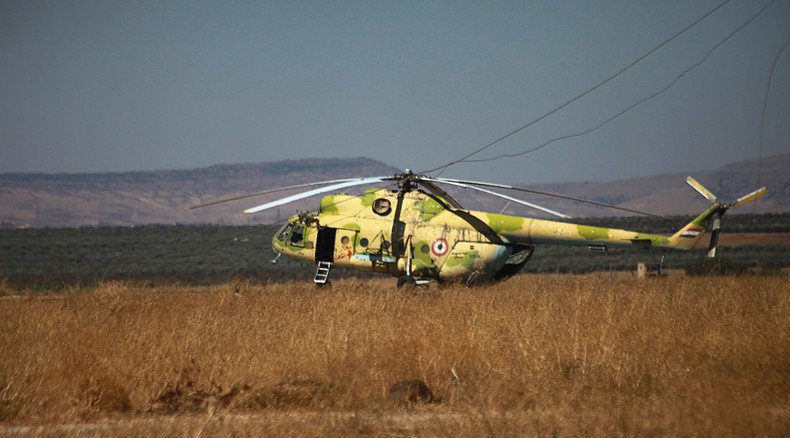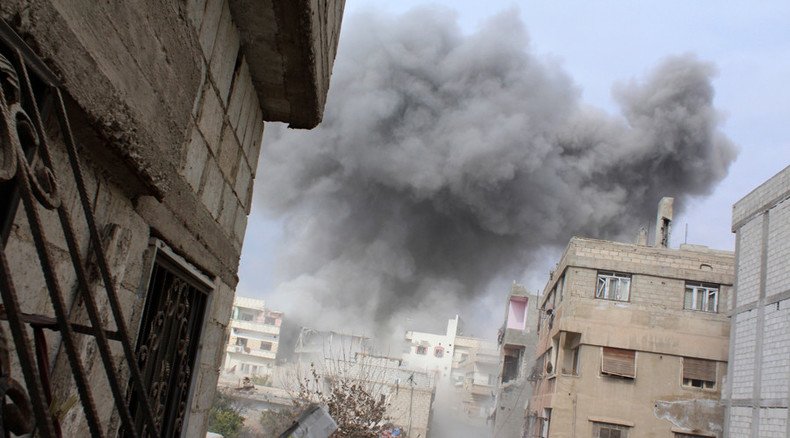‘Question remains over Assad’s motivation for alleged chemical attacks’

The US is again attempting to blame the Assad government of carrying out chemical attacks in 2013. Russia is demanding firm evidence of such a claim, but so far it’s ‘six of one, half a dozen of the other,’ says international security expert, Charles Shoebridge.
The UN Security Council has called to create an inquiry that will seek to prosecute those behind chemical weapons attacks in Syria. The 15-member bloc was unanimous in its vote on the resolution. The Security Council will now ask the UN and the head of the chemical weapons watchdog to prepare the inquiry.
Russia says it hopes the appointed experts will be professional and objective in their work. Charles Shoebridge gave his insight into the issue in an interview with RT.
RT:There have been many allegations from the West over Syria’s alleged use of chlorine against the rebel opposition. What is your perspective on the overall situation?
Charles Shoebridge: I think what’s happened in the past has certainly suited Western foreign policy, of course, we are talking specifically about the policy of the United States, backed by Britain and France, in support of their clients or their states in the Middle East, like Saudi Arabia and Qatar, to use this chlorine issue as a way to put pressure on the Assad regime. Specifically, the rebel groups and many human right groups in the West have – wittingly or unwittingly – sided with those rebel groups to some degree to use the chlorine issue that allegedly Assad is dropping bombs from helicopters that contain chlorine to demand a no-fly zone [in Syria].

Of course, that would prevent Assad’s helicopters and aircraft from attacking rebel positions, because that is the great advantage that they have over the rebels. So there’s always been this question as to what the possible motivation could be for Assad to be using chlorine against these targets, when it’s almost agreed as a consensus amongst most experts that chlorine is a highly ineffective – that’s to say, not effective weapon at all.
So the question is: Why are these chemical attacks taking place? You remember two years ago after the Ghuta attacks when sarin was used, but then again, it’s unclear by which side. Because the people who had to gain from these attacks in prompting a Western response for an attack on Assad would clearly have been the rebels. So what we’ve had up to now is resolutions and attempted resolutions condemning just one side of the Syrian War. As we know, it’s a very complex situation there with jihadists and extremist groups, such as ISIS and Al-Qaeda-linked groups like Al-Nusra Front involved. What we’ve had on this occasion is a resolution – I’ve read through it – it’s very neutral in its terminology. It aims to establish an evidence base for establishing blame for these attacks.
And, of course, Russia is in agreement with this because it has always said in the past, ‘Yes, we will condemn Assad, but what’s the evidence that it’s actually Assad doing this?’
RT:The UN is hoping a new inquiry will help find the perpetrators of the chemical attacks in Syria. It’s been two years since the deadliest such attack near Damascus. What are the chances that the mission will succeed?
CS: In the past, the Organization for the Prohibition of Chemical Weapons - you’ll remember they won the Nobel Prize recently for their work in eliminating chemical weapons around the world - they’ve been investigating these alleged chlorine attacks, as well as the alleged attacks in the past. But it hasn’t been part of their mandate to ascribe blame. They will now mount what can almost be a criminal investigation… The problem with chlorine is that it’s difficult to get the evidence at the scene so we’re talking about circumstantial evidence. For example, it’s alleged that this weaponry is dropped by helicopter, and yet there is almost none if any video [of such attacks].
The statements, views and opinions expressed in this column are solely those of the author and do not necessarily represent those of RT.
LISTEN MORE:
The statements, views and opinions expressed in this column are solely those of the author and do not necessarily represent those of RT.











